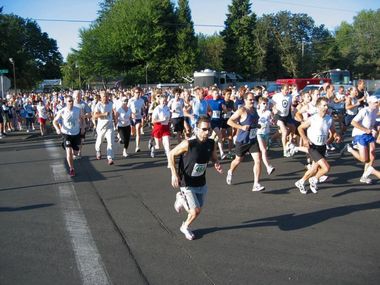A recent New York Times called ‘The Slowest Generation’ slams the younger generation for abandoning competition and running races ‘for the bling’. The article – and the ‘Dumbing Down, Slowing Down’ article that inspired it – contend that competitiveness is dulled in the aftermath of a generation raised on ‘everyone gets a medal’, and finishing is now its own reward.
The articles point to an increase in average finish times for races, the increased popularity of non-timed ‘gimmick’ races such as color and mud runs, and the move to stop funding elite runners at races by Competitor Group. They say that the effect is the removal of competition from the sport because few young people feel they have anything to prove.
But are those the only possibilities? Let’s look at some other options:
- Older Runners Just Entering the Field: there is a reason Boston qualifying times get relaxed as you age – runners slow down as the body ages. So if you have more older runners in the field, the average time will slow. Yes I know the articles talk about guys over 50 lamenting coming in just outside of the top 10%, but every longer race I’ve done has been dominated by some really fast folks in their late 20s getting good times.
- Running is More Popular Than Ever: This is related to the first point. The article points to the 1983 Boston Marathon, where 84 people broke 2:20 and compares it to the 22 who broke that time in 2011. To the authors it is evidence of declining competition – but they ignore the rather obvious conclusion that 1983 was an anomaly. Even the runners state that fact – perfect weather, qualifying event for Worlds, etc – and note that the surrounding years produced nothing similar.
- ‘Gimmick Runs’ skew the data My first race was a Komen 5K. I know a bunch of people who did the run to raise money and support a cause. They didn’t care about the time, just about having a good time. I went out to do the best I could and appreciated the timing chip and tracking – but others really didn’t care at all. Tracking is expensive – why put in the extra money (that could go to charity) when no one cares?
- Running for the Long Term: I have heard from several folks who were decently fast (perhaps not ‘elite’ but well sub-3 hour marathoners) who decided after realizing they would never be elites that they would rather slow down and be able to run for many more years.
- The Best Runners are Chasing Money in Other Sports: I guess I share a certain cynicism with those other article writers. I see more and more people viewing life through the lens of what can get them the most money the fastest with the least work. Kids see that they can earn more in a few months with a single viral YouTube video than a jazz artist will earn from a lifetime of hard work and dedication … and they respond to that reward system. Running is not a ‘money’ sport, and ‘paid amateur’ is a status that has gotten harder to maintain, so it suffers from the same attrition of talent as other non-money sports.
But even taking all of these into consideration, it is hard to debate that elite American running talent has thinned in the last three decades. That year there were nearly 200 American men who ran a sub-2:20 marathon… and each of the last two years there were fewer than 75 men who achieved that distinction.
At the same time I am bothered because the entire thing smacks of the same ‘if your time isn’t better than X, then you are not a REAL runner’ mentality that needs to just stop now. It is one thing to talk about the lack of Americans running the same pace as 30 years ago, and another entirely to blame mud and color runs for the ruination of competitive running.
Personally, I would never run ANY race with anything other than the best of my ability. I will never challenge the elites, but I keep working to improve my times – but always while enjoying myself and focusing on both short and long-term goals.
What do you think? Is a lack of competition ruining running? What about other sports – are we losing our edge in an ‘everyone wins’ society?


I’m not going to bother reading the article, because you’ve already described how dumb it is. But, some comments:
The difference between 1983 and 2011 is that there are so many other great marathons to run in April besides Boston. London, and particularly Rotterdam, are quite large and generally more reliably faster for the elite runners.
To me, there is nothing better than the fact that so many people are running races fir the emptiness rather than the competition. At a time when we worry about growing obesity, ANY reason to make people exercise should be encouraged, not lamented.
“At a time when we worry about growing obesity, ANY reason to make people exercise should be encouraged, not lamented.”
So totally agree with this.
And it isn’t like we are suddenly not going to have timed races – people DO love to compete and be measured and know what they have done. So what if casual races that are more about fun and fundraising and camaraderie are not timed if they get people out there moving?